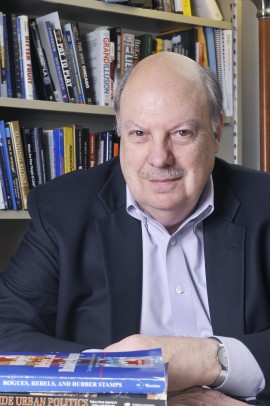More divided votes signal evolving city council
Chicago aldermen are becoming more independent from Mayor Rahm Emanuel, although at a slow pace, according to a new report by the UIC political science department.
The study — produced by Dick Simpson, professor of political science; Maureen Heffern Ponicki, graduate student; Allyson Nolde, undergraduate student; and Tom Gradel, a former political media consultant — measured aldermanic voting patterns and the opposition Emanuel has faced since June 2015.
According to the report, five aldermen voted 100 percent of the time to support the mayor’s position on divided roll call votes and another 22 voted with him 90 percent of the time.
“However, the number of aldermen voting with the mayor less than 90 percent of the time on divided votes has risen to 23 over the last two years,” Simpson said. “Aldermen are also more willing than in the past to produce their own legislation and propose solutions to critical city problems rather than wait for, or to clear, their proposals with the 5th floor.”
From June 17, 2015, to March 29, 2017, there were 67 divided roll call votes, which is when at least one or more aldermen vote against the mayor and his administration.
Some of the most contentious issues with the closest divided roll call votes included equity in contractor job opportunities for minorities at the airports, police misconduct, regulation of “shared economy” services like Uber and Airbnb, 2016 city budget tax increases and appropriation of tax increment finance (TIF) funds.
The council’s Progressive Caucus has seen increased activity and growing independence, including 10 aldermen, and could develop into a permanent independent bloc, according to the researchers, who also note that the group becomes more effective when it joins the Black or Hispanic caucuses.
The findings suggest that Emanuel is “undeniably weaker” now than in his first term in office as he has lost popularity among voters and the city’s social problems have become more visible and pressing. Among some of the factors noted for this development are the 2015 runoff election, the video of the Laquan McDonald shooting, the city’s gun violence crisis, and police misconduct.
While the mayor doesn’t have as much clout as before and aldermen are freer to act on their own and to oppose him, he is still able to pass his legislation.
“Even though the increase in divided votes during the past two years signals rising independence on the part of aldermen, the mayor has still not lost a vote,” Simpson said. “He has not needed to use his veto and he still has overall control over the council.”
The full report, “Chicago’s Evolving City Council: Chicago City Council Report #9,” details voting patterns and historical comparisons.

